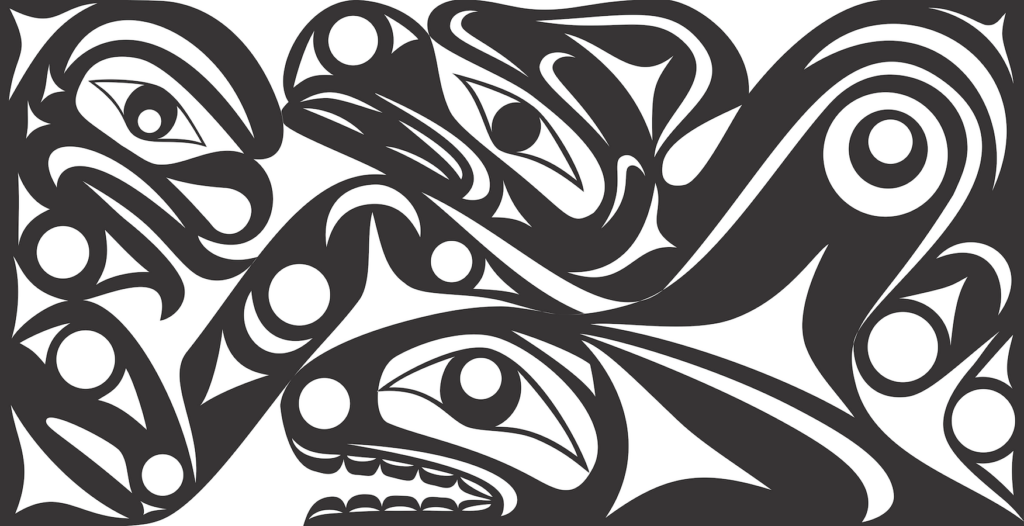Andrea Wilbur Sigo, Squaxin Island

The story behind the artwork on our websites
Tamanimas, Northwest Coast design by Andrea Wilbur Sigo, is visible in the theme artwork across Seattle Public Schools websites.
Meet Andrea Wilbur-Sigo
Andrea Wilbur Sigo is a traditional Native American Artist who is breaking barriers. She is a carver, which is unusual for women, and she has a computer sciences degree which she uses to synthesize her traditional designs into contemporary creations.

Growing up in a family of artists, her earliest memories are of creating art. She sold her first piece when she was eight years old and before long she was selling her pieces all over the world. Realizing how blessed she was to learn traditional arts at home, she is now sharing her knowledge and gifts with the youth in her community to ensure the techniques are not lost.
She not only carves, but she also produces beadwork, weavings, button blankets, basket weaving, bentwood boxes, paddles and creates beautiful two-dimensional designs. Andrea creates her own carving tools and creates her own natural dyes for the wool she uses for her weavings.
She is a renowned carver whose latest project is the welcoming pole at the new housing at Chief Seattle Club in Pioneer Square which will be over twenty feet tall upon completion. The pole should be raised fall of 2021. She serves her tribe as a member of the Early Childhood Development Parent Board and is a board member of the Squaxin Island Tribal Museum.
Seattle Public Schools is incredibly grateful to Andrea who has graciously allowed the use of her design, throughout our sites.
Andrea is enrolled Squaxin Island, and a descendent of the Skokomish, Jamestown S’Klallam, Nisqually, Tulalip and Yakama tribes.
The Story of The Great Tam’anamis, by Frank Allen
Long ago there was a Skokomish man who lived at Enatai a village which is at the end of the Skokomish Reservation on the Hoods Canal. This man was an only child. He had five daughters and one son. Because he had no nephews and only his one son he wanted the best for his son.
He trained his son as a young boy to get a great tam’anamis. We Skokomish call this power tiya’tbax (a great underwater tam’anamis). This man would send his boy to the great bluff way up the Hoods Canal. The father says “now my son you go to such and such place and dive. You take these sticks with you.” So the boy went. In two days he came back to his father. But he hadn’t got any thing. Again his father sent him, but Again he didn’t find anything. Then Again the third time, his father sent him a different place this time, looking for sharks. He took his two sharp sticks with him and went.
This time he didn’t come back for three or four days and his father went to look for him. He found his son and took him home. When he found him he asked “Did you find anything?” “Yes, Yes” so he takes him home very pleased. When he gets home he asks, “What did you get?” I struck tiya’tbax , he put me in where he lives.
We must show your power so everyone comes to see the power of the boy. They fill the house and his father says “what are we going to feed all these people?” ‘Don’t worry”, the son says! But we have no food the father replies so people come, come, come, the house is now full. What are they going to do?
The young man gets up and says to the people “You’ll eat all you want, people. Everything you want!” And he reaches down and pulled something out of his lower leg, his shine. It was a whale bone war club. On one side there was a carving of ducks and salmon and on the other side a carving of seal and salmon. Then he say, “ Alright now all of you to the beach!” So they go down to the shore and the young man holds out the club and shouts “give me, give me”! And salmon rush the beach. The people kill the salmon and have lots of food now.
That’s the power doing this. He now had power over all animals under water. A great Tam’anamis.
He tells his father “now I must go from tribe to tribe and share my wealth so no one goes hungry. So away he goes to all the neighboring villages always coming home in the fall to bring the salmon home to the Skokomish people.
Use the following to share this page: http://ewjklf.xyhlw.net/web-art
